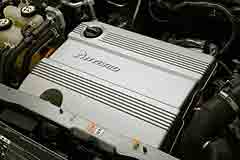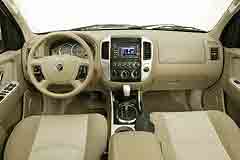New Car Review of the 2007 Mercury Mariner Hybrid Compact Sport Utility Vehicle

Base MSRP Range: $21,380 - $29,225
Base Invoice Range: $19,965 - $27,190
MSRP As Tested: $32,275
Versions: AWD Hybrid
Vehicle Category: Hybrid Compact Sport Utility Vehicle
Engine Location: Front Engine
Drive Wheels: All-Wheel Drive.
Engine as Tested: 2.3-liter, Dual Overhead Cam, 16-valves, I-4, 133 - horsepower at 6,000 rpm and 124 lb-ft torque at 4,250 rpm.
Transmission: CVT automatic.
Fuel Economy (city/hwy): 33/39
Standard Safety Features: Driver and passenger airbags, 4-weel ">Antilock disc brakes, Tire-pressure monitor.
Competition: Ford Escape, Honda CR-V, Jeep Liberty, Kia Sportage, Lexus RX400h, Mazda Tribute, Subaru Forester.

If you've noticed environmentalists have gotten a little more timid when they gripe about SUVs, this might be the reason why.
Sport utility vehicles, long criticized for their gluttonous appetite for gas and dirty emissions, are turning greener thanks to hybrid technology. Among these Earth-friendly SUVs is a new hybrid version of the 2007 Mercury Mariner, which offers better fuel economy and cleaner emissions with virtually no drawbacks.
Just like the groundbreaking Toyota Prius and Honda Civic Hybrid cars, the Mariner Hybrid uses a small, four-cylinder engine in conjunction with an electric motor to deliver great gas mileage, low emissions and decent performance. It accelerates similar to the V6 Mariner, but it gets about 33 miles per gallon on the highway compared to the V6's 24 mpg.

Indeed, the differences between the hybrid Mariner and its conventional counterpart are subtle. From the outside, the only way you can tell the hybrid apart from any other Mariner is by looking for a few special badges and a small air vent, and even from the driver's seat it's easy to forget you're driving a hybrid because it feels so similar to the regular SUV.
The biggest difference is the transmission. Whereas most Mariners have a run-of-the-mill automatic transmission, the hybrid version uses a continuously variable transmission that never shifts. It constantly adjusts to find the perfect combination of performance and economy.
Like all hybrids, it uses big batteries and a powerful electric motor to supplement a relatively small gas-powered engine. The batteries recharge every time the vehicle brakes, so it never has to be plugged in.
In addition, the gas engine shuts down every time the vehicle stops to save more fuel and cut down on emissions. As soon as you lift your foot off the brake, it starts right back up.
The Mariner's hybrid system doesn't feel quite as refined as either the Prius or Civic Hybrid. It's difficult to tell when the engine starts and stops in both those cars because they run so smoothly and have been engineered to start up so effortlessly. In the Mariner Hybrid, though, the engine rumbles and shakes a little when it starts back up, making the start and stop of the engine quite obvious at each red light.
Inside, the Mariner's gauges aren't quite as polished and flashy as either the Prius or Civic Hybrid. It has a small LCD screen on the dash - probably the smallest one available in a car today - that doubles as an efficiency gauge and a navigation system.

Other than having much better gas mileage and a different transmission, the hybrid Mariner is virtually identical to the standard version. That means it has a comfortable interior, decent cargo capacity and a smooth ride, all factors that have made the Mariner and its Ford cousin, the Escape, a hot seller.
The biggest disappointment is that the hybrid technology is not available on lower-end equipment packages. While a traditional Mariner starts at $22,870, the hybrid model is $27,895. Compared to the base Mariner, that kind of a price premium quickly eats up any money you could save at the pump.
On the other hand, $5,025 is a small price to pay for feeling good about taking care of the environment.

Pros:It has everything that makes the Mercury Mariner a good SUV -- comfort, maneuverability and versatility -- along with eco-friendly hybrid technology.
Cons:It costs several thousand dollars more than a regular, non-hybrid Mariner, so it's not likely to save much money on gas unless oil prices skyrocket.
Ratings (1-10)
- Style: 8
- Performance: 9
- Price: 4
- Handling: 5
- Ride: 6
- Comfort: 7
- Quality: 7
- Overall: 7
More Data
Where Built: USA
Major Options: Comfort Package, Moon and Tune Package, Rear Cargo Convenience Package, Hybrid Energy and Audio Package, Premium Package, Class II Trailer Tow Package. Rear-obstacle-detection system, Power sunroof, Leather upholstery, Upgraded sound system, Rear privacy glass, Running boards, Special Purpose Wheels and Tires, Full-size spare tire.
Seating: 5
Number of Rows: 2
Length in Inches: 174.3
Warranties: 3 years/36,000 miles Bumper to Bumper, 8 years/100,000 miles Extended powertrain, 5 years/unlimited miles Corrosion Protection, 3 years/36,000 miles Roadside Assistance.
Weight in Pounds: 3787 lbs.
Cargo Capacity in Pounds: 920 lbs.
Gross Maximum Vehicle Weight in Pounds: Not available.
Towing Capacity in Pounds: 1000 lbs.
Gas Tank Capacity in Gallons: 15.0
Destination Charge: $615




